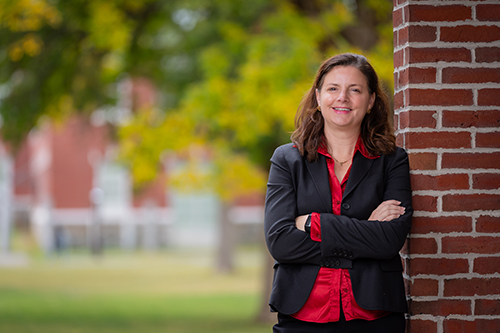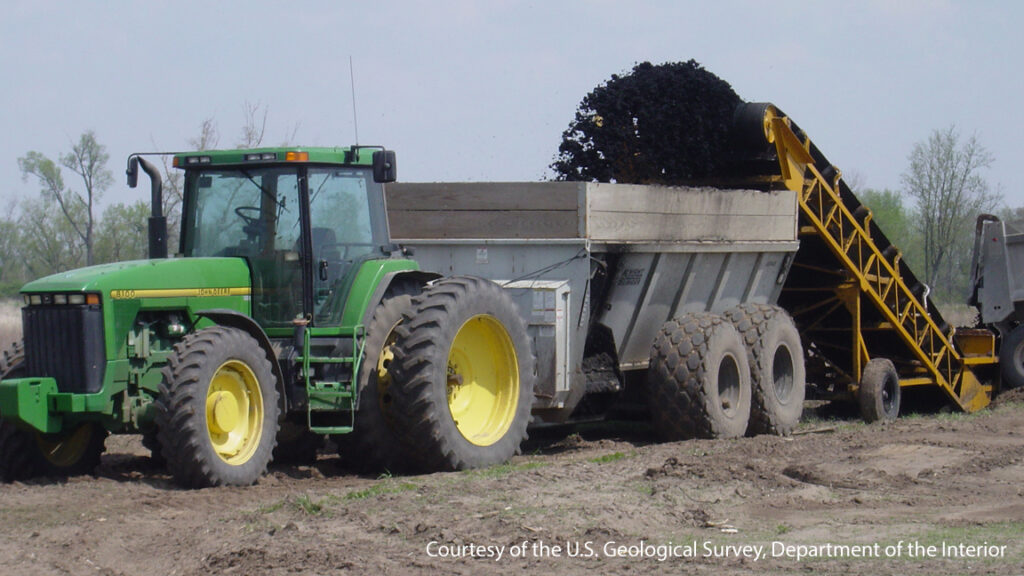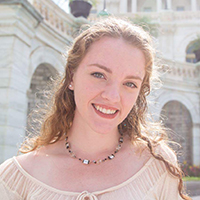Caroline Noblet’s Secret to Talking About PFAS: Be clear about what we do, and don’t, know

Story by Sam Schipani
The harmful health impacts of a group of chemicals known as PFAS, or per- and polyfluoroalkyl substances, is a pressing issue facing Mainers, as it increasingly found in our soil, water, and bodies. The science behind PFAS is complex and new, and despite the urgency of the situation, the facts can be hard to communicate as it evolves. One researcher who has become adept at helping people navigate the growing environmental crisis is Caroline Noblet, associate professor of economics and member of the University of Maine Senator George J. Mitchell Center’s PFAS Research Initiative.
Noblet is a behavioral environmental economist, which means she has dedicated her career to studying why people make the choices they make about the environment, and what context influences those choices. She is the only social scientist involved in the Mitchell Center’s PFAS Research Initiative, and has been a leader in the burgeoning research exploring how best to talk to the public about these so-called “forever chemicals” in a way that helps people make more informed choices.
Noblet and her Mitchell Center colleagues are among many UMaine faculty members working together on a variety of PFAS research projects and outreach efforts as part of the university-wide PFAS+ Initiative. That initiative builds on efforts by University of Maine Cooperative Extension and Mitchell Center’s initiative to provide communities with important information regarding PFAS. Additionally, there are many ongoing collaborative projects across UMaine engaged in the assessment, impact and mitigation of these chemicals.
As Noblet continues working on PFAS issues through research, media appearances and policy work along with her team at the Mitchell Center’s PFAS Research Initiative, she said that there is one main thing to keep in mind: researchers have to be honest about what they do and don’t yet know about PFAS, in order to maintain the public’s trust while tackling the PFAS crisis in Maine and beyond.
Noblet’s background
Noblet is a native Mainer and a graduate of Gardiner Area High School. In college, she studied economics, but had a love for the environment from back when she was a little girl.
“I had the chance to travel a lot as a kid. I realized that Maine is a cool and special place and the natural environment is something I really cared about,” she said.
Noblet returned to Maine for her graduate studies at UMaine, where she worked with her longtime mentor Mario Teisl, a professor of economics, studying the impact of labels on economic choices. She became fascinated by behavioral economics.
“When it’s April and it’s 60 degrees, we’re all in shorts and we’re like, ‘Woohoo!’ Whereas if it’s maybe September and it gets down to 60 degrees, we’re putting our jacket on because we had summer of warm weather,” Noblet said. “That’s what I mean by context. Economics has all sorts of wonderful, longstanding theories saying ‘People will behave this way,’ but what we’ve learned with behavioral economics is that people will behave differently depending on the context that they’re in. It’s our job to understand when they will change their behavior.”
Noblet became a faculty member at UMaine in 2007. She combined her passion for the environment with her academic expertise in behavioral economics to study a wide range of topics, from aquaculture to renewable energy.
She teaches a number of economics classes at both the undergraduate and graduate level. Through being a teacher, Noblet learned the power of making a problem feel relevant by providing real-world examples that people can connect to. In her lectures, she uses economic theories like status quo bias to understand the housing market right now, or the tragedy of the commons to understand how resources are overused in the world’s oceans.
“My teaching philosophy is always to help people make connections to the real world,” Noblet said. “I don’t expect them to be behavioral economics or experimental economists, but I do expect them to be engaged citizens.”
Taking up the gauntlet of PFAS

In 2020, the state of Maine asked whether the Mitchell Center could form an interdisciplinary team to address a variety of PFAS issues. The Mitchell Center was a natural choice given their focus on both sustainability and interdisciplinary research. David Hart, director of the Mitchell Center, brought together researchers from across UMaine, including engineers, ecologists and groundwater hydrologists, to form the PFAS Research Initiative.
One of the scientists he reached out to was Noblet. Her social science background made her unique not just on her team, but the broader field of PFAS research as well. Hart saw Noblet’s expertise in behavioral economics as essential to figuring out public perceptions of PFAS risks, and how to shape policies for reducing those risks.
Noblet eagerly accepted the invitation.
“One of the reasons that I love and appreciate the Mitchell Center is the people who are similarly drawn to that interdisciplinary approach are really awesome researchers who want to marry specialized skill sets with other ones,” Noblet said. “Most of the problems are bigger and badder than what my skill sets can handle. I don’t have the hubris to think I can solve these problems myself.”
Noblet said that the team has done great work since forming, including publishing a social science paper in the Maine Policy Review regarding PFAS contamination for a Maine audience as well as a full team paper on lessons learned in Maine for an academic audience in BioInterphases, as well as ongoing projects.
She said their research shows that the way PFAS is discussed matters enormously for public perception. People learning about PFAS, as is often true of many environmental problems, often want to blame someone, whether it is industry for PFAS creation or government for (perceived) limited guidance. If people spend all their time figuring out who to blame, though, they are less likely to work towards finding a solution to the problem.
“What if we remind people you have used and benefited from PFAS?” Noblet said. “I like nonstick pans and rugs and couches that don’t let stains sink in. What if we talk about it that way? Does that change people’s willingness to contribute financially or otherwise to the problem?”
Communicating the science

Between Noblet’s background in behavioral economics and her experience with PFAS, she has thought a lot about how the issue should be approached when talking to the public. She also drew on her experience during the COVID-19 pandemic, observing how difficult it can be for the public to process new information when an issue is complex.
“We’re asked to take in new information that’s inconsistent with old information, that’s really hard,” Noblet said. “It’s asking for a level of trust. That’s where I start from.”
Noblet said that when she discusses PFAS publicly, she is already at an advantage because UMaine has long been considered a trusted source of information for residents statewide. Still, she is conscious of maintaining that trust through the way she talks about uncertainty.
“I also say it right up front: We don’t know what we don’t know about PFAS yet,” Noblet said. “I understand that it is incredibly frustrating to be told one day based on our standards your water is fine, and then to be told however much time later it actually doesn’t meet the standards anymore and you’re going to need to invest in a filter system. Telling people right up front that things are going to shift is a really important part of the puzzle.”
Her approach has garnered her media coverage . She recently appeared on the podcast Resources Radio by Resources for the Future, one of the top environmental economics think tanks in the world, discussing the PFAS issue. Daniel Raimi, who hosted the episode, said that Noblet impressed him with her aptitude.
“Based on my interview with Caroline, I think she is a very effective communicator about PFAS,” Raimi said. “It’s a very complex topic and she makes it easy for a wide range of folks to understand the potential environmental and human health risks of PFAS.”
Her colleagues at the Mitchell Center have been equally impressed.
“Caroline excels in her ability to communicate about complicated issues like PFAS,” Hart said. “She not only has an outstanding understanding of the technical details, she brings this amazing combination of passion, warmth and humility to the discussion. If I could only give new researchers one bit of advice on effective communication, it would be to learn from Caroline’s podcast — she’s at the top of her game!”
For Noblet, the appearance was a point of pride as well. She said she uses Resources Radio podcasts in her classes, linking various episodes to topics in the syllabus to give students a different engaging way to learn more from experts in the field.
“It was a pretty smiley moment when I got to add that one of mine on the syllabus this year,” Noblet said.
Teaching students how to communicate
As the consummate teacher she is, Noblet has also made it her mission to teach her students how to communicate their research as well. She makes sure that her students are involved outside of UMaine. Noblet herself collaborates closely with partners at the Maine Departments of Environmental Protection and Inland Fisheries and Wildlife to work on PFAS issues.
“That’s another really important part of the communication puzzle: did you do this in a silo, sitting in your university office, or did you talk to some people working in this space already?” Noblet said.

Molly Shea, who recently completed her undergraduate degree, worked on the Maine Policy Review paper about Mainers’ preferences for addressing PFAS with Noblet and graduate student Charity Zimmerman. She also presented at the 2023 UMaine Student Symposium about her work at the PFAS Research Initiative studying landfills and the hidden cost of PFAS.
Shea said that Noblet fostered a “positive and nurturing research environment” for her students.
“Her exceptional working relationships with peers and stakeholders are a testament to her professionalism, and brilliance in the field. She goes above and beyond to create opportunities for growth, whether it’s encouraging [students] to present at conferences, apply for internships or pursue other avenues for personal and professional development,” Shea said. Dr. Noblet not only imparts her extensive knowledge and expertise, but also instills in her students a sense of confidence and ambition that extends beyond the confines of the academic setting.”
Shea is back at UMaine to pursue a graduate degree and continue studying PFAS. She was awarded a graduate fellowship with the National Science Foundation’s One Health and the Environment National Research Traineeship that funds her graduate research. Her work focuses on how communication impacts the public perception of PFAS.
Noblet said that Shea, herself, is exceptional.
“She herself is an excellent communicator,” Noblet said. “We can pretend I taught her something about that.”
Contact: Ruth Hallsworth, hallsworth@maine.edu
